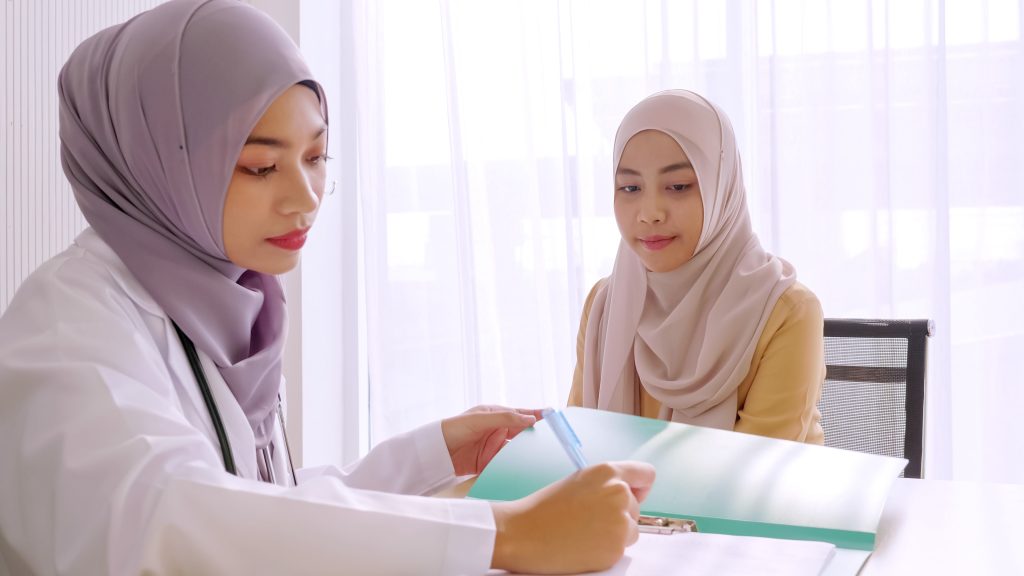
Health Insurance for Women in Singapore: A Must-Read Guide
08 May 2025
Common Diseases That Affect Women

1. Breast Cancer
Breast cancer is the most common cancer among women in Singapore. While lifestyle factors, genetic predisposition, and hormonal influences contribute to the risk, early detection significantly improves survival rates. Breast cancer symptoms can vary from person to person, but common signs include:
- A lump or thickening in the breast or underarm area
- Changes in breast size or shape
- Unexplained pain in the breast or nipple
- Skin changes on the breast, such as dimpling, redness, or scaliness
- Nipple discharge (other than breast milk), including blood
- Inverted or retracted nipple
Because breast cancer can develop without noticeable symptoms in the early stages, regular mammograms are crucial. Singapore’s National Screening Programme—Screen for Life—recommends annual mammograms from age 40 and biennial screening from age 50. Early detection allows for prompt treatment before the cancer spreads, improving the chances of successful recovery.
2. Cervical Cancer
Cervical cancer is primarily caused by the human papillomavirus (HPV) and is largely preventable through HPV vaccination and routine Pap smears. A Pap smear can detect abnormal cell changes in the cervix early, allowing for timely treatment before cancer develops.
In its early stages, cervical cancer may not present noticeable symptoms. However, as the disease progresses, common symptoms include:
- Abnormal vaginal bleeding, such as bleeding between periods, after intercourse, or post-menopause
- Unusual vaginal discharge that may be watery, bloody, or have a foul odour
- Pain or discomfort during intercourse
- Persistent pelvic pain or lower back pain
- Increased urinary frequency or pain during urination
Because symptoms may not appear until the cancer has advanced, regular cervical cancer screening is essential. In Singapore, Pap smears and HPV tests are recommended for women aged 25 and above as part of the National Screening Programme—Screen for Life. Early detection can help prevent the progression of cervical cancer, improving treatment outcomes and survival rates.
3. Gynaecological Conditions (PCOS, Endometriosis, Fibroids)
There are several gynaecological conditions that can impact a woman’s quality of life and reproductive health:
- Polycystic Ovary Syndrome (PCOS): Polycystic Ovary Syndrome disrupts hormone levels and causes irregular periods, excessive hair growth, and fertility issues. Lifestyle changes, medication, and weight management can help regulate symptoms.
- Endometriosis: Endometriosis occurs when tissue similar to the uterine lining grows outside the uterus, leading to severe menstrual pain, discomfort, and potential fertility complications. Early diagnosis and medical management can help control symptoms.
- Uterine fibroids: Uterine fibroids are non-cancerous growths in the uterus that may cause heavy periods and pelvic pain. Though often harmless, they may require treatment if symptoms become severe.
Regular gynaecological check-ups are essential to detect and manage these conditions effectively.
4. Osteoporosis
Osteoporosis weakens bones, making them more prone to fractures. Women are at a higher risk of developing osteoporosis, particularly after menopause, due to the decline in oestrogen levels, which accelerates bone resorption (breakdown) faster than bone formation. Pregnancy and breastfeeding also contribute to an increased risk of osteoporosis.
Osteoporosis is often called a “silent disease” because it progresses without noticeable symptoms until a fracture occurs. However, some signs that may indicate weakening bones include:
- Loss of height over time due to spinal compression
- A stooped posture or a curved upper back (kyphosis)
- Back pain caused by fractured or collapsed vertebrae
- Increased risk of fractures, especially in the hip, wrist, or spine, even from minor falls or injuries
- Weak grip strength or reduced bone density detected in scans
Because osteoporosis often remains undiagnosed until a fracture happens, early prevention and regular bone density screening are crucial. Preventive measures for osteoporosis include:
- Maintaining a calcium-rich diet with dairy, leafy greens, and fortified foods
- Getting sufficient vitamin D through sunlight exposure or supplements
- Engaging in weight-bearing exercises such as walking, jogging, or resistance training to strengthen bones
- Avoiding smoking and excessive alcohol consumption, which can weaken bone structure
Regular bone density tests, especially for postmenopausal women or those at high risk, can help detect osteoporosis early and reduce the risk of fractures.
5. Urinary Tract Infections (UTIs)
Urinary tract infections are more common in women due to anatomical differences — women have a shorter urethra and one that is closer to the rectum compared to men, meaning that bacteria have a shorter distance to travel to the bladder. In fact, research has shown that about 40% of women will develop a UTI at some point in their life.
Symptoms of a UTI include a frequent urge to urinate, pain during urination, and cloudy or strong-smelling urine. To prevent UTIs:
- Drink plenty of water to flush out bacteria
- Maintain proper hygiene, especially after using the toilet
- Avoid holding in urine for long periods
- Wear breathable cotton underwear to reduce moisture buildup
Recurrent UTIs may require medical treatment and further evaluation.
Precautions Women Should Take for Better Health

Taking proactive steps can help women prevent, detect, and manage common health concerns, leading to a longer and healthier life. In Singapore, where lifestyle, genetics, and environmental factors play a role in women’s health risks, prioritising preventive care is essential. Here’s what you can do:
1. Stay on Top of Regular Health Screenings
Early detection saves lives. Regular screenings help identify health conditions before they become severe, allowing for timely treatment. The Singapore government’s Screen for Life programme offers subsidised screenings based on age and risk factors. Women should schedule:
- Mammograms (for breast cancer detection) annually from age 40 and biennially (every 2 years) from age 50.
- Pap smears & HPV tests (for cervical cancer) every three years from age 25, or HPV testing every five years.
- Bone density tests for osteoporosis, especially for postmenopausal women or those at higher risk.
- Cholesterol and blood pressure checks to monitor heart disease risks, particularly for women over 40.
2. Adopt a Healthy Lifestyle
A well-balanced lifestyle can reduce the risk of chronic diseases such as cancer, osteoporosis, and heart disease. Essential habits include:
- Eating a nutrient-rich diet with adequate calcium, vitamin D, and antioxidants to support bone and immune health.
- Staying physically active with weight-bearing exercises like walking, jogging, and strength training to improve bone density and cardiovascular health.
- Prioritising mental well-being through stress management, mindfulness, and quality sleep.
3. Get Vaccinated for Protection
Vaccinations play a crucial role in preventing diseases that disproportionately affect women. Consider these essential vaccines:
- HPV vaccine to reduce the risk of cervical cancer. Recommended for women aged 9 to 26, but also beneficial beyond this age group.
- Flu shots to strengthen immunity and reduce complications from seasonal flu.
- Pneumococcal and hepatitis B vaccines, particularly for women with underlying health conditions.
By staying informed, adopting a proactive approach to health, and making use of Singapore’s healthcare resources, women can take charge of their well-being and prevent serious health conditions before they arise.
How Insurance Can Help Cover Healthcare Costs

While preventive measures are crucial, having adequate health insurance in Singapore ensures financial preparedness for unexpected medical expenses. Here are key health insurance options for women in Singapore:
- MediShield Life: MediShield Life provides basic hospitalisation coverage for all Singaporeans and Permanent Residents but may not fully cover complex medical treatments.
- Integrated Shield Plan (IPs): Integrated Shield Plans complement MediShield Life coverage with higher coverage for hospitalisation and better class wards if hospitalisation is required
- Critical Illness Plan: Critical Illness Plans provide a lump sum payout upon diagnosis of serious illnesses like cancer, helping to cover treatment and recovery costs.
- Corporate insurance: Group Corporate Insurance Plans from employers may include coverage for pre-existing conditions and hospitalisation benefits.
In addition, several private insurers offer coverage for female-specific illnesses, cancer and surgery, while others can cover for pregnancy complications and congenital illnesses. Here’s a brief table of some of the most popular women’s health insurance plans in Singapore.
Popular Women's Health Insurance Plans in Singapore
Feature | |||||
|---|---|---|---|---|---|
Coverage Options | S$25,000-S$50,000 | S$25,000-S$100,000 | S$25,000+ | S$30,000-S$80,000 | S$25,000-S$150,000 |
Female Cancers Covered | – Breast – Cervix uteri – Uterus – Ovary – Fallopian tube – Vagina/vulva | ||||
Female Cancer Payout | 100% | ||||
Carcinoma in situ | 20% | 50% | 50% | 10% (breast/female) | 50% |
Premium Waiver | Not specified | 36 months | 24 months | Not specified | 36 months (twice) |
Unique Features | – 5% renewal bonus – Second opinion on cancer – Health screening every 2 years (from 3rd year) | – Optional add-ons for pregnancy – 15% discount on first-year premium – Health screening every 2 years | – Death benefit (S$10,000) – Outpatient psychiatric benefit – Biennial health screening (from 2nd year) | – In-hospital reimbursement (up to S$8,000) – Traditional Chinese Medicine (up to S$500) – S$100 annual health exam – Monthly wellness benefit (up to S$1,000 x 6 months) | – Reset benefit feature – Free child cover (S$5,000) – Biennial health check-ups (worth up to S$400) – Premium waiver can be claimed twice |
Additional Coverages (coverage amount) | – Rheumatoid arthritis (100%) – S.L.E with lupus nephritis (100%) – Osteoporosis (30%) – Urinary incontinence (5%) | – Hormone replacement therapy (20%) – Breast cancer molecular gene expression profiling test (40%) | – Oocyte cryopreservation (25%) – Hormone replacement therapy (5%) – Thyroid disorders requiring surgery (15%) | – Compassionate death allowance (S$5,000) – Post-hospitalisation outpatient reimbursement (S$1,000) | – Oocyte cryopreservation (S$25,000) – Molecular gene expression profiling test (S$10,000) – Hormone replacement therapy (S$5,000) |
*Information is up-to-date as of 5 Mar 2024. Please visit each plan’s website for plan information before making a purchase decision.
Unsure about your current health coverage? Use our Coverage Checker to assess your protection.
Prevention is better than cure
Women face unique health challenges that can impact their daily lives. Regular health screenings play a crucial role in the early detection of potential conditions, allowing for timely intervention and better long-term health outcomes. While some conditions, such as gynaecological disorders and osteoporosis, may be unavoidable or have no cure, leading a healthy lifestyle can help manage symptoms and improve overall well-being.
Comprehensive health insurance provides financial security and peace of mind in the face of medical uncertainties. Prioritising your health today lays the foundation for a stronger, healthier future.




